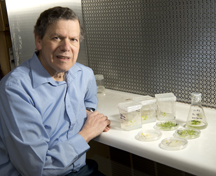
Purdue professor Stanton Gelvin sits next to Arabidopsis seedlings in his laboratory. A team led by Gelvin identified a gene that could be the key to faster and easier genetic modification of plants considered resistant to standard methods. (Credit: Purdue University photo/Mark Simons)
A recent discovery could lead to easier genetic modification of plant varieties considered recalcitrant to standard methods, including varieties of economically important crops.
A Purdue University research team identified a gene that influences susceptibility to infection by Agrobacterium tumefaciens, a bacterium that is used as a tool to insert genes into plants to produce traits such as resistance to pests, diseases or harsh environmental conditions or to improve the nutrition or shelf life of a crop.
“There is a great need for a way to genetically modify plants not only on a large scale for important cash crops but also on a small scale for research,” said Stanton Gelvin, Purdue’s Edwin Umbarger Distinguished Professor of Biological Sciences who led the research. “What we’ve discovered could lead to a way to increase a plant’s susceptibility to Agrobacterium infection and open the door to its use on a much broader range of plants.”
Agrobacterium-mediated plant transformation is widely used in the agricultural biotechnology industry, but it doesn’t work well for many varieties and species of plants, he said.
“Some of the most elite and desirable cultivars in agriculture can only be improved through the age-old genetic modification method of breeding, which is less genetically precise, requires numerous steps and takes years,” he said.
The team studied genes in Arabidopsis, a small plant related to mustard that is a common research model. The researchers identified a gene that plays a central role in susceptibility to genetic transformation and discovered the mechanism and specifics of its action. Bioinformatic analyses and gene libraries suggest this gene is also found in corn, soybeans, wheat, oilseed rape, cacao, rice and many others, but the team needs to verify this experimentally, Gelvin said.
“This could go beyond the major economic crops and allow this type of genetic engineering to be applied to trees used for paper, fruit and ornamental trees, and flowers,” he said. “This is not the only gene involved in genetic transformation susceptibility, but it is a global regulator that influences a whole suite of genes and plays a very significant role in this process.”
A paper detailing the team’s results was published in Science Signaling and is available online. In addition to Gelvin, co-authors include Rebecca Doerge, the Trent and Judith Anderson Distinguished Professor of Statistics; former postdoctoral research fellows and research associates graduate students Nagesh Sardesai, Huabang Chen and HoChul Yi; associate research scientist Lan-Ying Lee; visiting scholar Alexandra Stirnberg; former graduate student Gayla R. Olbricht; and undergraduate students Jacob Jeffries and Kia Xiong.
The team conducted genetic screens of Arabidopsis mutants hyper-susceptible to Agrobacterium infection to identify genes responsible for susceptibility. Through these screens the team discovered that a mutation in the gene MTF1 affected susceptibility to infection and genetic transformation. Plants in which MTF1 is suppressed were more susceptible to transformation.
The team also found that cytokinin, a plant hormone secreted by Agrobacteria, triggers a cascade of molecular events that lead to the suppression of MTFI and the activation of another gene that may aid the infection process. The gene that is activated encodes a protein that sits on the surface of the cell and may allow Agrobacterium to bind better to the plant cell, Gelvin said.
“We uncovered an entire molecular signal transduction pathway that reveals how the secreted cytokinins suppress the expression of the gene MTF1, which in turn increases the expression of the gene AT14A and a protein that makes a plant more susceptible to infection byAgrobacterium,” he said. “The end result is a plant that is much more susceptible to genetic transformation. Perhaps reducing the expression of MTF1 in other plants will have the same effect.”
MTF1 is important for normal plant development, so it cannot be completely knocked out or eliminated without killing the plant, but there are ways to reduce its expression, Gelvin said.
The team is working on developing technology to translate their findings into a tool that can reduce the expression of MTF1 and genetically transform a plant in one step, he said.
Gelvin credits the depth of skill at Purdue in the area of genomics and statistics for the success of the study.
“When evaluating gene regulation it isn’t a simple yes or no answer, sometimes a 10 percent change matters,” he said. “In addition to our ability to perform these genetic screens and analyses, it was a careful statistical analysis that revealed subtle changes of significance and led us to our target. Sharing of expertise and collaborative work is how science gets done.”
Source: Purdue University
Published on 10th March 2014


